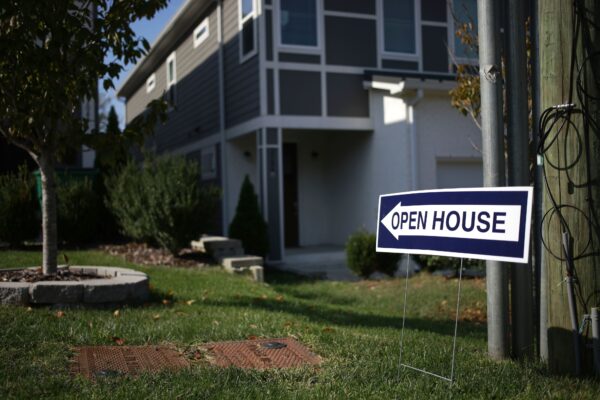By Charlie Wells
US homebuyers are getting cold feet.
Home-sale cancellations are rising, as higher mortgage rates and fears of a recession give potential buyers second thoughts about whether this is the right time to jump in a housing market that appears to be cooling down.
In July, some 63,000 home sales fell through across the US, representing roughly 16% of the properties that entered into contract. That was the most in data going back to 2017, with the exception of March and April 2020, when early pandemic lockdowns froze the US real estate market.

If you need to back out of a housing contract you’ve already agreed to, what options do you have? Here is what experts contacted by Bloomberg News recommend:
At Stake
For most buyers, the worst that can happen upon exiting a transaction is losing their “earnest” money. That is the roughly 1% to 5% of the home purchase price paid into an escrow account as a deposit after the offer was accepted. One of the purposes of earnest money is, of course, to provide sellers security that the offer was serious.
Buyers who do need to back out shouldn’t worry about being forced to buy, says Doug Michie, a financial adviser, lawyer, and real estate broker at Ventura Coast Wealth Management in Ventura, California.
“The courts will not make a buyer perform,” he says. “I mean, how do you make a buyer get a loan?”
Buyers with different budgets may feel the sting of losing earnest money differently. Still, Jeff Tucker, a senior economist at Zillow Group Inc. says it’s crucial not to let what might be considered a “sunk cost fallacy” skew the expensive financial decision of buying a home.
The sunk cost fallacy is a cognitive bias in which investors focus too much on the costs of past investments and end up making bad decisions about future ones.
Tucker offers the example of an investor who put down $5,000 in earnest money. That person may wake up one day in a cold sweat, concerned they put in an offer that was, say, $50,000 too high. Walking away from that $5,000 might be expensive, but there is a good chance it would leave that person in a better position than taking on an asset inflated by $50,000.
Contingencies
The good news about canceling a property transaction is that there are levers buyers can pull to back out. These are called “contingencies.” They are criteria that must be met for a real estate contract to be binding. If they aren’t met, a buyer can walk away, taking her earnest money with her.
The rules vary from state to state, but contingencies often include the property passing a physical inspection, a mortgage appraisal and title checks. Others include criteria such as the buyer securing mortgage approval or even selling her prior home.
“The one that I actually like the most is the investigation of the property,” says Michie. From foundations to plumbing to insulation, there are numerous factors an inspector may find to give a buyer a legitimate exit — or at least space to renegotiate.
Tucker of Zillow says the appraisal contingency is also a helpful guardrail for buyers. Mortgage providers conduct appraisals because they want to ensure the house is worth the loan amount in the event of a foreclosure.
“It’s a bit of insulation against maybe overpaying for a home,” says Tucker. “If the appraiser comes back saying, ‘Whoa, you agreed to pay much more for this home than our market analysis estimates that it’s worth,’ that probably should give you a cause to stop and reconsider.”
The bad news is that in the latest housing market frenzy, many buyers waived contingencies such as inspections in order to get a leg up amidst the competition. This, Michie says, is best avoided.
Credit Scores
Buyers who walk away from a deal — with or without their earnest money — often worry about the impact on their credit score of turning down a mortgage offer. But experts say the effect of either accepting or declining is effectively the same.
“The only way anything can have any impact, positive or negative, on a consumer’s credit score is if it ends up on their credit reports,” says John Ulzheimer, a credit expert who has worked at FICO and Equifax Inc. “The act of backing out of a mortgage — meaning you’ve applied and maybe have even been approved and had a closing date scheduled but chose to stop the presses before the actual closing — does not appear on a credit report.”
Still, applying for a mortgage means the broker or lender pulled all three of a buyer’s credit reports. Those three inquiries will remain on a buyer’s credit reports for the next 24 months and might have a negative impact, Ulzheimer says. Still, he points out that inquiries are the least meaningful component of credit scores.
Bad Manners
Even buyers who make it through the process of backing out unscathed financially may face other problems.
“It is not a good look to back out,” says Daryl Fairweather, the chief economist at Redfin Corp., a real estate brokerage. “If you live in an area or you’re looking at an area where word travels fast, the next person whose home you put an offer on might not accept your offer.”
Emotion weighs heavily on residential transactions. Houses are much less liquid, and typically conjure up many more feelings, than sales involving assets like stocks and bonds. That only adds to the responsibility on a potential buyer to research a home and market before putting in an offer, says Fairweather.
“Even beyond the reputational issue, I think it’s just bad manners,” she says.
More stories like this are available on bloomberg.com




